Samuel Coleridge-Taylor: August Composer of the Month
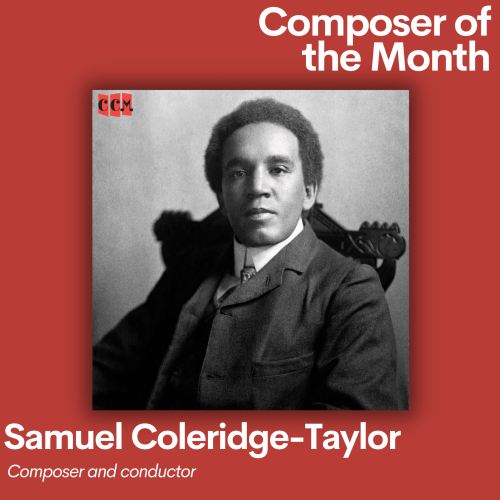
As we continue to explore the fascinating world of music history, certain composers really stand out. They leave a lasting impact that continues to shape our appreciation for music. This August, we are focusing on one such influential figure in classical music – Samuel Coleridge-Taylor.
Coleridge-Taylor’s Early Life
Samuel Coleridge-Taylor was born in London in 1875 to an English mother and a father from Sierra Leone. He grew up with his mother as the main parent-figure and she nurtured his love for music. However, his grandfather recognized his musical abilities and purchased his first violin for him. By the age of fifteen, Coleridge-Taylor earned a scholarship to the prestigious Royal College of Music.
Coleridge-Taylor’s Career
During his time at the Royal College, Coleridge-Taylor studied under the renowned composer Charles Villiers Stanford. Stanford recognized his pupil’s talent early on and encouraged him to specifically focus on composition. Evidently, this guidance proved pivotal in Coleridge-Taylor’s career, leading him to compose his first acknowledged work, “Piano Quintet in G minor,” at just 18 years of age.
Coleridge-Taylor’s pinnacle moment came with his choral work “Hiawatha’s Wedding Feast.” This piece premiered in 1898 and was an instant triumph. This catapulted him to fame and led to international tours, including three visits to the United States, where he conducted his works with leading orchestras.
During his career, Coleridge-Taylor faced racial prejudice, but he never let it deter him. Alternatively, he used his platform to challenge and overcome these societal barriers, garnering the respect and admiration of his contemporaries and future generations.
Music and Legacy
Coleridge-Taylor’s music masterfully intertwines elements of Western classical music and African melodies. His compositions resonate with a distinct rhythmic vitality and melodic richness that echo his dual heritage.
Moreover, his magnum opus, “Hiawatha’s Wedding Feast,” is a testament to his brilliant compositional skills. It’s an enchanting blend of Romantic-era harmony with a libretto based on Henry Wadsworth Longfellow’s epic poem “The Song of Hiawatha.” The use of flowing melodies, choral harmonies, and colorful orchestration in this work demonstrate his profound understanding of musical drama.
However, to focus only on this would be to neglect other remarkable works like “Symphony in A minor,” “24 Negro Melodies,” and “Violin Concerto in G minor.” Each piece showcases a different facet of his compositional genius. For example, the “Violin Concerto in G minor” brims with romantic lyricism, showcasing the violin’s expressive range. Additionally, “24 Negro Melodies” explores African melodies in a profound display of his cultural pride.
A Final Note
Samuel Coleridge-Taylor’s life and work are a testament to his indomitable spirit, talent, and the limitless power of music. His unique blending of Western classical music and African influences left an enduring legacy, earning him a rightful place amongst the greatest composers.
Though he died at the young age of 37, Coleridge-Taylor left behind a diverse body of work that continues to resonate with audiences. As we celebrate his life this month, we invite you to explore his works to discover the profound emotional depth and rich cultural history in each composition.

July Student of the Month: Piah Dabu
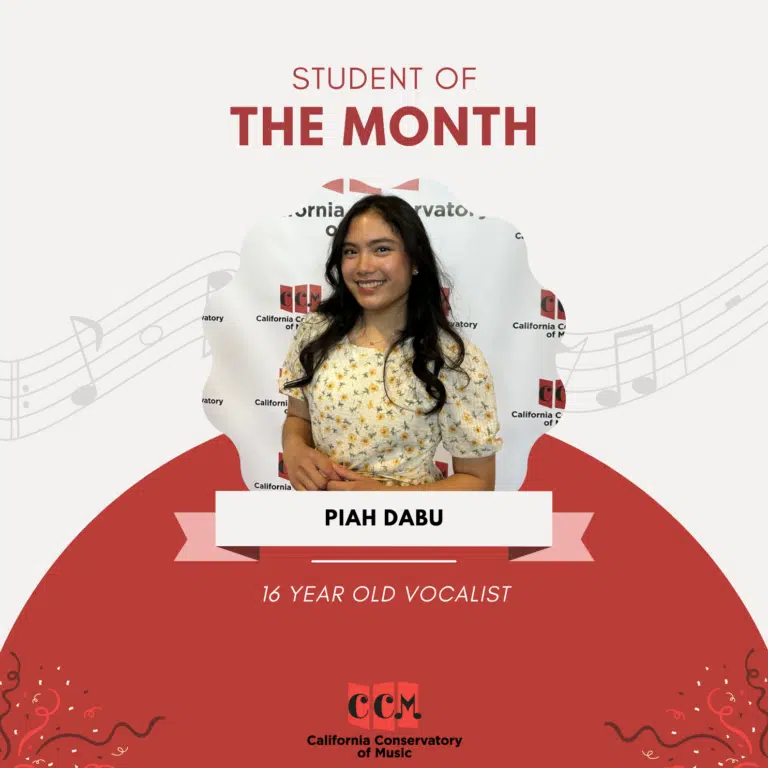
This July, we’re excited to spotlight CCM voice student, Piah Dabu, as our Student of the Month! Piah has been taking voice lessons at CCM for 1 year. She currently studies at CCM’s Sunnyvale location with Teacher Gaby. Teacher Gaby let us know that she is always prepared for her lessons and is dedicated to practicing consistently! Piah adapts well and is willing to try pop, musical theatre, art song, and even opera. Teacher Gaby says she’s incredibly respectful, open-minded, and a joy to teach!
Student of the Month – Piah Dabu
What is your name?
Piah Dabu
How old are you?
16
Who is your teacher?
Teacher Gaby
How long have you been taking voice lessons?
1 year
What advice would you give to a voice student just starting out at CCM?
Stay consistent with practicing, and have confidence in yourself. Don’t be scared to crack or mess up because you’ll never know what you’re capable of until you go for it!
What song are you looking forward to learning someday?
On my Own from Les Miserables
What is your favorite thing about singing?
Our voice is a part of us, meaning I don’t have to bring an object to sing!! My favorite thing is you can express emotions through singing. When you understand the lyrics, it is fun to act out the song.
What is your favorite food?
Sinigang (Filipino soup)
Do you have a pet?
Nope.
Do you play any sports or do any other activities outside of music lessons?
I was on swim team for a while, but took a break because I did musical theatre this year!
What do you want to be when you grow up?
I’m still thinking about wha I want to be.
What is your most memorable experience at CCM?
Singing at the spring recital!
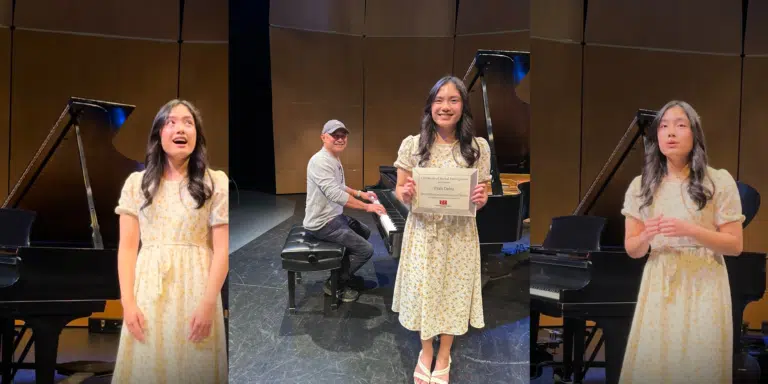
Parent Spotlight – Sarah Dabu
Regarding voice instruction, what are you most proud of your child accomplishing?
Piah grew up very shy and quiet. She didn’t want to sing in front of anyone. With the help of voice lessons, she gained confidence specially during the recital. That is what I’m most proud of. I am proud that she finds joy in performing and overcomes nervousness. She becomes a different person when she steps on the stage.
What advice would you give a new parent starting in the program?
Keep supporting your child, especially if music is their passion. It’s an amazing skill to know an instrument.
Why did you decide to give your child a musical upbringing?
I noticed how Piah had the potential to use her voice ever since she was 3. I didn’t want to push her into taking voice lessons. (She didn’t want to take lessons as a kid because she was very shy.) I was surprised when she asked me if she could take them last year. I’m very happy that she made that decision.
Below you can find a snippet of Piah’s performance at the spring recital!

The Importance of Consistent Music Practice
-
Establishing a Strong Foundation
-
Facilitating Steady Progress
-
Retaining Knowledge and Skills
-
Overcoming Musical Challenges
-
Cultivating Discipline and Time Management
John Stafford Smith: July Composer of the Month
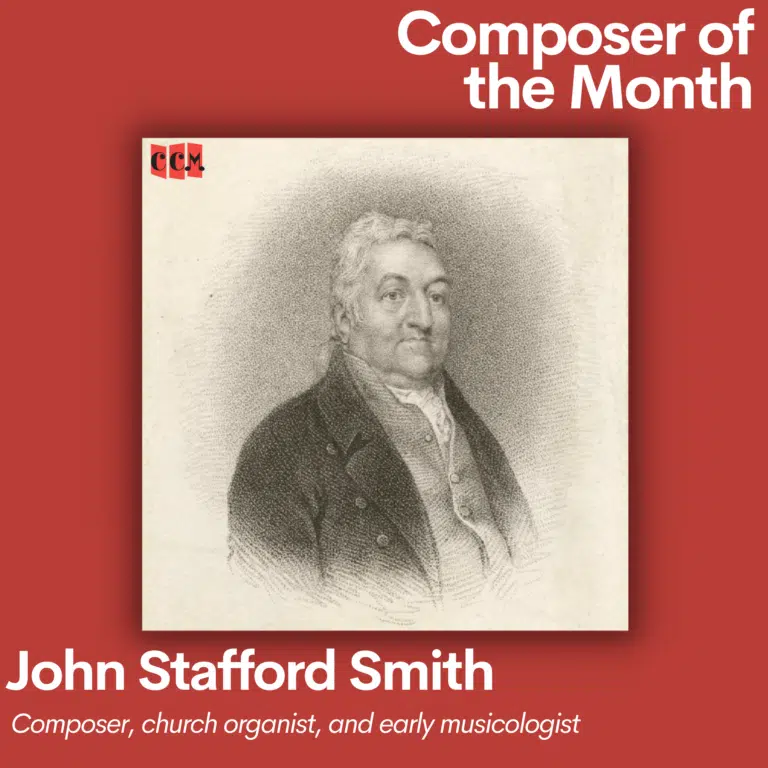
John Stafford Smith: A Brief History
John Stafford Smith was born in 1750 in Gloucester, England. From a young age, he showcased remarkable musical talent. He received comprehensive musical education and training as he studied under esteemed composers of his time. Smith’s career blossomed in London, where he emerged as a prominent musical figure in the late 18th-century. Smith created symphonies, chamber music, and choral compositions that all showcased his immense talent.The Story Behind “The Star-Spangled Banner”
“The Star-Spangled Banner” originated during the War of 1812, a conflict between the United States and the British Empire. In September 1814, poet, Francis Scott Key witnessed the British bombardment of Fort McHenry in Baltimore Harbor. He was then inspired to write a poem titled “Defence of Fort M’Henry.” Key was seeking a fitting melody for his powerful verses and turned to his friend, John Stafford Smith. Smith’s composition, “To Anacreon in Heaven,” originally written for a British men’s social club, proved to be the perfect match for Key’s patriotic lyrics. Together, they transformed the melody into what would become one of the world’s most recognizable national anthems. In 1931, “The Star-Spangled Banner” officially became the national anthem of the United States, symbolizing the nation’s unity, resilience, and indomitable spirit.National Anthems: A Brief History
National anthems hold great cultural and historical significance, offering valuable insights into a country’s identity and heritage. They serve as musical symbols of national unity, resilience, and pride. Here are a few reasons why national anthems are worth exploring:Historical Context
National anthems provide a window into a nation’s past, reflecting its struggles, triumphs, and collective memory. They embody historical events and moments of national significance, offering a deeper understanding of a country’s heritage. National anthems are sonic narratives that connect present generations to the triumphs and challenges faced by their predecessors, fostering a sense of continuity and national pride. Through the evocative power of music, national anthems become a living testament to a nation’s history, allowing us to experience the emotions and aspirations that have shaped past generations.Musical Analysis
Exploring national anthems allows us to appreciate the melodic and harmonic elements that define them. By examining their structure, tonality, and musical motifs, we gain insights into the compositional techniques employed by different composers and the cultural influences that shaped their creations. You can learn a lot about a country’s music history from their national anthem!Cultural Identity
National anthems are rich expressions of a country’s cultural identity, encompassing its traditions, values, and aspirations. By studying anthems from various nations, we can embrace the diversity of global musical heritage and foster intercultural understanding. The origin of national anthems also vary, and can provide even more information about the nation’s culture and history.Emotional Connection & Evolution
National anthems evoke a sense of pride, unity, and patriotism among citizens. By engaging with these powerful musical compositions, we can experience the emotional resonance they hold for individuals and communities. National anthems can also evoke important conversations regarding a nation’s successes and failures. The anthems can also inspire other songs and art pieces that speak to lived experiences. John Stafford Smith’s composition of “The Star-Spangled Banner” represents a pivotal moment in musical history. Through its triumphant melody and patriotic lyrics, it encapsulates the enduring spirit of a nation. National anthems, like “The Star-Spangled Banner,” are musical artifacts provide us with valuable insights into the cultural, historical, and emotional dimensions of countries around the world. Let us continue to celebrate and appreciate the composers who have left their indelible mark on our musical landscape, reminding us of the profound power that music holds in shaping our collective identity.
June Student of the Month: Orlann Louis-Marie
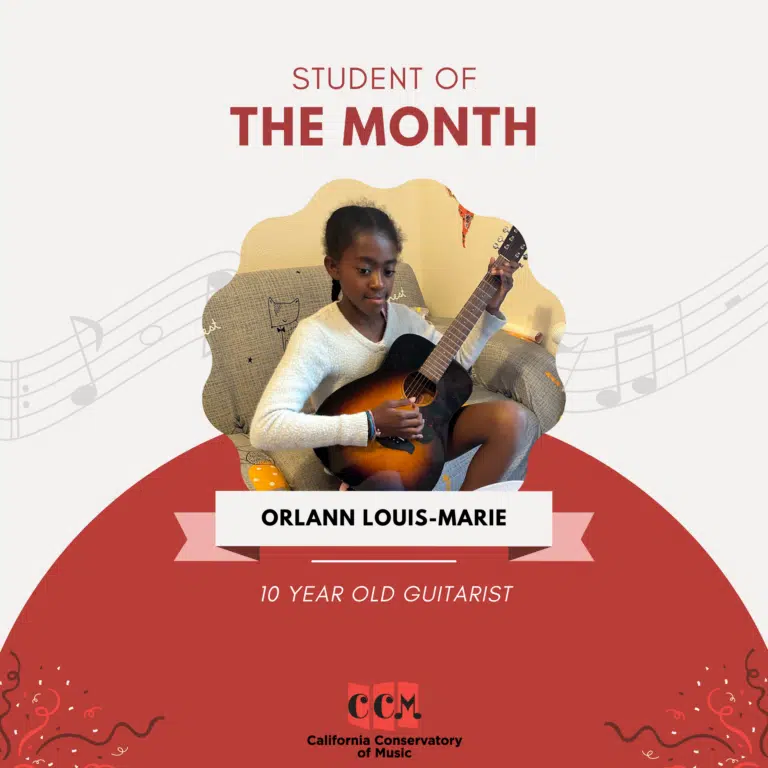
This June, we’re happy to highlight CCM guitar student, Orlann Louis-Marie, for our Student of the Month! Orlann has been taking guitar lessons at CCM for around 2 years. She currently studies at CCM’s Sunnyvale location with Teacher Rebecca. Orlann practice every day and has made amazing improvements over the years!
Student of the Month – Orlann Louis-Marie
What is your name?
Orlann Louis-Marie
How old are you?
10
Who is your teacher?
Teacher Rebecca
How long have you been taking guitar lessons?
2 years
What advice would you give to a guitar student just starting out at CCM?
Even if it is difficult, do not quit. Guitar is a good instrument.
What piece are you looking forward to learning someday?
Learning songs that have a fast tempo that others can sing along to.
What is your favorite thing about playing guitar?
It calms me down.
What is your favorite food?
Raclette. It is a traditional Swiss dish with melted cheese on potatoes.
Do you have a pet?
No
Do you play any sports or do any other activities outside of music lessons?
Soccer and climbing.
What do you want to be when you grow up?
I want to be a psychologist
What is your most memorable experience at CCM?
My first recital because I had never played in front of a crowd.
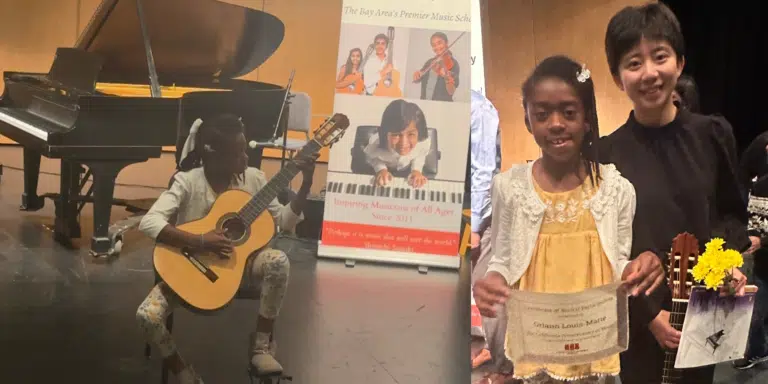
Parent Spotlight – Gwladys Louis-Marie
Regarding guitar instruction, what are you most proud of your child accomplishing?
I’ve really seen my daughter grow through her guitar playing. She has become more independent and curious in her desire to learn more.
She is learning to overcome her frustration when a piece seems difficult at first and I’m very proud of her perseverance. She’s realizing that her regularity is paying off and she is proud of herself. That makes me happy!
What advice would you give a new parent starting in the program?
Starting a musical upbringing is always exciting at the beginning but it is a journey with ups and downs. It really made us question our intentions when our schedules were full and I was the one who had to remind the practice times. Learning an instrument is at the same time, rigorous and gratifying. I think we’ve reached a point in our family where we can confidently say that music education is here to stay.
Being present by your child’s side even if you’re not a musician seems essential to me. This is a great opportunity where I get to remind my daughter to be patient and kind with herself and congratulate her on all her efforts.
Why did you decide to give your child a musical upbringing?
Music is part of our everyday life in our family. We wake up with it, commute with it and go to bed through music. I think music is a beautiful way to connect with our emotions and with others. I personally didn’t receive any solid musical training and I knew it was something I wanted to create in my children’s life. The same way I consider plurilingualism as a wonderful skill, I see music as a gift that allows my child to express herself in a worldwide language.

5 Tips for Choosing the Perfect Music Teacher
Finding a music teacher that connects well with your child is crucial for meaningful and effective music lessons. The right teacher can provide invaluable guidance, inspire creativity, and foster a love for music. However, selecting the perfect music teacher can be a daunting task. We’ve put together essential tips for finding the right music teacher for your child to enhance their learning experience and help them reach their musical goals.
Research and Credentials
When searching for a good music teacher, thorough research is key. It is important to look for teachers with solid credentials and qualifications. Consider their educational background, professional experience, and any notable achievements or accolades. A teacher with a strong musical foundation will be well-equipped to impart knowledge and nurture talent. At CCM, all of our instructors at least have their bachelor’s degree in music, but many have gone on to receive their masters as well. A lot of our teachers were even classmates together at the San Francisco Conservatory of Music! You can learn more about our teachers here.
Teaching Style and Approach
Being aware of a teacher’s style and approach is key for finding the proper fit. Some teachers may teach a classical repertoire only, while others are open to jazz, pop, and more. For this tip, it’s crucial that you reflect on your own learning preferences and goals to find a teacher whose approach resonates with you. If you would like your child to eventually learn how to compose their own music, you should make this priority clear to the teacher prior to signing up for lessons. However, a teacher who can adapt their teaching style to suit your individual needs will ensure a productive and enjoyable learning experience. At CCM, our instructors do a great job of catering the lessons to you and taking your age, level, and learning style. You can schedule a free trial lesson with one of our teachers to see what lessons would be like and to discuss your expectations and goals!
Performance Opportunities
A good music teacher should be able to support their students’ paths to success! Look for testimonials or reviews from current or past students to gauge their teaching abilities. Consider the progress their students have made, both in technical skills and overall musical development. Regular performance opportunities are important as well! Teachers should be able to prepare students for recitals, competitions, or other performances. At the California Conservatory of Music, we hold free bi-annual recitals for students. The recitals usually take place in the winter and spring and they are free for families and friends to attend! It’s always amazing to see how quickly students are progressing.
Motivating & Engaging Style
Effective communication is essential for a beneficial teacher-student relationship. An experienced music teacher will have strong interpersonal skills, practice patience, and be able to provide helpful constructive feedback in a supportive way. During an initial consultation or trial lesson, you will be able to assess their communication style and determine if it is a good fit. A teacher who can foster a positive and nurturing environment will enhance the learning journey. At CCM, teachers provide their students with fun practice challenges to keep them motivated and excited! Students can win prizes and awards such as ribbons, medals, trophies, and more.
Passion and Enthusiasm
The perfect music teacher will exude passion and enthusiasm for what they do. Their love for the art form should be evident in their teaching style and how they interact during the lessons. A passionate teacher will inspire and ignite enthusiasm in their students, making the learning process more engaging and enjoyable. Many of our teachers at CCM are working musicians and music is their passion! We have faculty recitals annually and teachers are constantly performing all around the Bay Area.
Finding a music teacher is obviously the first step to music lessons and a music education overall. Through thorough research and preparation, you will find a teacher who will meet your expectations, inspire you, and guide you on the musical journey. Remember, the right teacher can make all the difference!
Sign up for your free lesson at the California Conservatory of Music!

Caroline Shaw: June Composer of the Month

Caroline Shaw: A Rising Star in Contemporary Classical Music
Caroline Shaw is a composer, violinist, and vocalist who has quickly become one of the most exciting and innovative voices in contemporary classical music. She is the youngest person to ever win the Pulitzer Prize for Music, and the world’s leading ensembles have performed her work.
Shaw was born in Greenville, North Carolina, in 1982. She began playing the violin at the age of two, and she started composing at the age of ten. She studied violin performance at Rice University for her undergraduate degree. After graduating from Rice, she went on to earn her master’s degree in violin performance from Yale University.
While at Yale, Shaw focused more on composition. She studied with Steve Reich, and people praised her work for its originality and beauty almost immediately. In 2013, she received the Pulitzer Prize for Music for her a cappella piece “Partita for 8 Voices.” At the time, she was only 30 years old, making her the youngest person ever to win the prize.
Work as a Composer
Shaw’s music is often described as “contemporary classical” or “minimalist,” however, her work defies easy categorization or labels. She draws inspiration from a wide range of sources, including folk music, jazz, and pop. Her music is often playful, unpredictable, and deeply expressive.
Furthermore, leading ensembles such as the Kronos Quartet, the New York Philharmonic, and the Los Angeles Philharmonic have all commissioned Shaw’s works. Plus, musicians have performed her works at major festivals around the world, including the Salzburg Festival and the BBC Proms.
Musical Career
In addition to her work as a composer, Shaw is also a violinist and vocalist. She is a member of the Grammy-winning vocal ensemble, Roomful of Teeth and performed as a soloist with some of the world’s leading orchestras.
Shaw is a passionate advocate for new music. She is a co-founder of the music collective, Roomful of Teeth, and she is also a founding member of the advocacy group, New Music USA. She has a deep commitment to making new music accessible to a wider audience, and she is a tireless champion of emerging composers.
Shaw is a rising star in the world of contemporary classical music. Her work is innovative, meaningful, and deeply moving. She is a force to be reckoned with, and she is sure to continue to make waves in the years to come.
Shaw’s Compositions
One of Shaw’s most striking characteristics of her music is her use of silence. She often creates tension and suspense by juxtaposing long periods of silence with bursts of musical activity. This use of silence can be found in many of her works, including “Partita for 8 Voices” and “Narrow Sea.”
Additionally, Shaw utilizes unusual instruments and sounds in her music. In “Partita for 8 Voices,” she uses a variety of percussion instruments, including shakers, tambourines, and cowbells. She also incorporates vocal sounds, such as humming and breathing. This use of unexpected sounds helps to create a unique and otherworldly atmosphere in her music.
Shaw’s music is often described as “beautiful” and “moving.” Undeniably, she has a gift for creating music that is both intellectually stimulating and emotionally resonant. Her work is sure to continue to captivate audiences for years to come.
Conclusion
Caroline Shaw is a rising star in the world of contemporary classical music. Critics and audiences alike praise her work all around the world! Her musical endeavors and advocacy work is astonishing and setting a new precedent for musicians and composers in the classical music world.
Shaw’s impact on contemporary classical music is already huge. Her work helps to broaden the appeal of the genre, and she continues to inspire a new generation of composers. She is a true pioneer.

May Student of the Month: Elijah Yap

This May, we’re happy to spotlight CCM piano student, Elijah Yap, for our Student of the Month! Elijah has been taking piano lessons at CCM for 5 years. He currently studies at CCM’s Sunnyvale location with Teacher Dario. Elijah is always proactive with his practice! He is inquisitive in the lessons which enhances his learning experience that much more.
Student of the Month – Elijah Yap
What is your name?
My name is Elijah Rohan B. Yap.
How old are you?
I am 10 years old.
Who is your teacher?
My teacher is Teacher Dario.
How long have you been taking piano lessons?
I’ve been taking piano lessons at CCM since I was 5 years old.
What advice would you give to a piano student just starting out at CCM?
Keep practicing everyday and have fun and enjoy playing music.
What piece are you looking forward to learning someday?
I love to learn Kiss the Rain by Yiruma and more classical pieces like Canon in D by Pachelbel.
What is your favorite thing about playing piano?
My favorite thing about playing piano is that I get to play music that I like.
What is your favorite food?
My favorite food is a Filipino Escabeche that I personally call “vinegar fish soup.” It’s a fried fish cooked in a sweet and sour sauce.
Do you have a pet?
I have a Ball Python snake that I named Nagini from my favorite book and movie, Harry Potter.
Do you play any sports or do any other activities outside of music lessons?
I am not really into sports, but I sometimes play badminton and I play online games and spend time reading.
What do you want to be when you grow up?
I want to be a Cardiologist someday.
What is your most memorable experience at CCM?
My most memorable experience at CCM is participating in recitals and performing without mistakes.
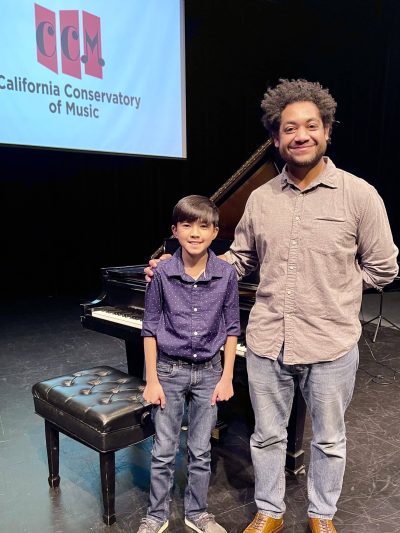
Parent Spotlight – Stella Yap
Regarding piano instruction, what are you most proud of your child accomplishing?
We are most proud of Elijah watching him play confidently at every recital in front of a lot of people and watching him work so hard and putting in a lot of effort and making sure he practices everyday and get every piece perfectly.
What advice would you give a new parent starting in the program?
Learning piano is a process that requires time. Try to be patient, and help your child to stay patient too. Encourage and motivate them to practice everyday, develop a routine but give your child the freedom to learn at their own pace, encourage them when they achieve new milestones, even if they’re just taking baby steps, and most importantly, let them have fun and make their music experience enjoyable.
Why did you decide to give your child a musical upbringing?
At a young age, Elijah already loved music and showed interest in learning how to play piano. In fact, he was the one who told us that he wanted to take piano lessons. As parents, we are here to support him and give him the opportunity to find passion and love on whatever that interests him, in this case, music. On the other hand, we know that learning music has a lot of benefits and can enhance every area of a child’s development.
Sign up for your free lesson at the California Conservatory of Music!

Music Education & Successful Public Figures
Music education is a proven crucial component in exceptional childhood development. Children who have had a music education have improved their cognitive skills, academic skills, emotional well-being, and more! Many public figures acknowledge that their early music education played a huge part in their overall success.
Music Education: A Brief Overview
Music education is the formal process of teaching music to students. This process can occur in different settings, including schools, private lessons, or community programs. It is designed to help students understand and appreciate music while developing their skills in playing musical instruments, singing, composing, or music theory.
A solid music education has several benefits for students.
- Cognitive skills: Music education is linked to enhanced memory, language, and reasoning skills. Students will improve their concentration, attention, and focus, which translates into better academic performance.
- Emotional skills: Music education also assists emotional development, such as empathy, self-esteem, and self-expression. It helps students manage stress and anxiety, as well as foster a sense of belonging and community.
- Social skills: Music education also encourages socialization and teamwork, as students often work together to create or learn music. It also promotes cultural awareness and respect for diversity.
Successful Public Figures
Over the years, many public figures have correlated their success with their early music education. These individuals are in various fields, including politics, business, science, and entertainment.
Albert Einstein
Albert Einstein was one of the most influential scientists of the 20th century. He developed the theory of relativity and made groundbreaking contributions to the field of physics. However, what many people may not know is that Einstein was an accomplished musician. He began playing the violin at the age of six and continued to play throughout his life!
Einstein once said, “If I were not a physicist, I would probably be a musician. I often think in music. I live my daydreams in music. I see my life in terms of music.” Einstein believed that music helped him to think creatively and abstractly, which he applied to his scientific work.
Steve Jobs
Steve Jobs, the co-founder of Apple Inc., is known for his innovative ideas and technological advancements. A little known fact is that Jobs was also a musician! He learned to play the guitar as a teenager and continued to play throughout his life.
Jobs believed that music helped him to think creatively and come up with new ideas. In a 1996 interview with Wired Magazine, he said, “If you want to be creative, you have to keep your mind open. And one of the ways to do that is to expose yourself to different experiences and different ways of thinking. Music was one of those things for me.”
Condoleezza Rice
Condoleezza Rice is a former United States Secretary of State and National Security Advisor. She is also an accomplished pianist and began playing at the age of three. Rice has spoken to how that music helped her develop discipline and focus, which she applied to her political career.
In an interview with NBC News, Rice said, “I think the lessons you learn from music are applicable to everything. It’s discipline. It’s focus. It’s the ability to work with others. All of those things are important in life, and certainly in leadership.”
Paul Allen
Paul Allen was a co-founder of Microsoft Corporation and one of the richest people in the world. He was also an artful musician and began playing the guitar at the age of 16. Allen felt that music helped him to think outside of the box and come up with innovative ideas, which he applied to his business ventures.
In an interview with The New York Times, Allen said, “I’ve found that playing guitar is a great way to escape from a stressful day at work. It’s a way to clear your mind and let your creativity flow. And sometimes, when you least expect it, that’s when the best ideas come.”
Yo-Yo Ma
Yo-Yo Ma is one of the most renowned cellists of our time. He began playing the cello at the age of four and has since won multiple Grammy Awards and performed in front of audiences worldwide. Ma believes that music helped him to develop discipline and perseverance, which he of course applied to his music career.
In an interview with The Guardian, Ma said, “Playing music requires a lot of hard work and dedication. It’s not something that you can just pick up and master overnight. But if you’re willing to put in the time and effort, the rewards can be amazing.”
Why Early Music Education Matters
The success of these public figures highlights the importance of early music education. Learning to play a musical instrument at a young age can have a significant impact on a child’s cognitive, emotional, and social development. Music education inspires discipline, focus, and creativity, as well as fosters a sense of belonging and community.
Moreover, music education can have long-term benefits for individuals, including improved academic performance, enhanced memory and language skills, and reduced stress and anxiety. It can also lead to a lifelong appreciation of music, which can bring joy and fulfillment to one’s life.
The correlation between public figures’ success and early music education should not be ignored. It is essential that we continue to prioritize music education in our schools and communities to ensure that all children have access to this valuable form of education.
Sign up for your free lesson at the California Conservatory of Music!

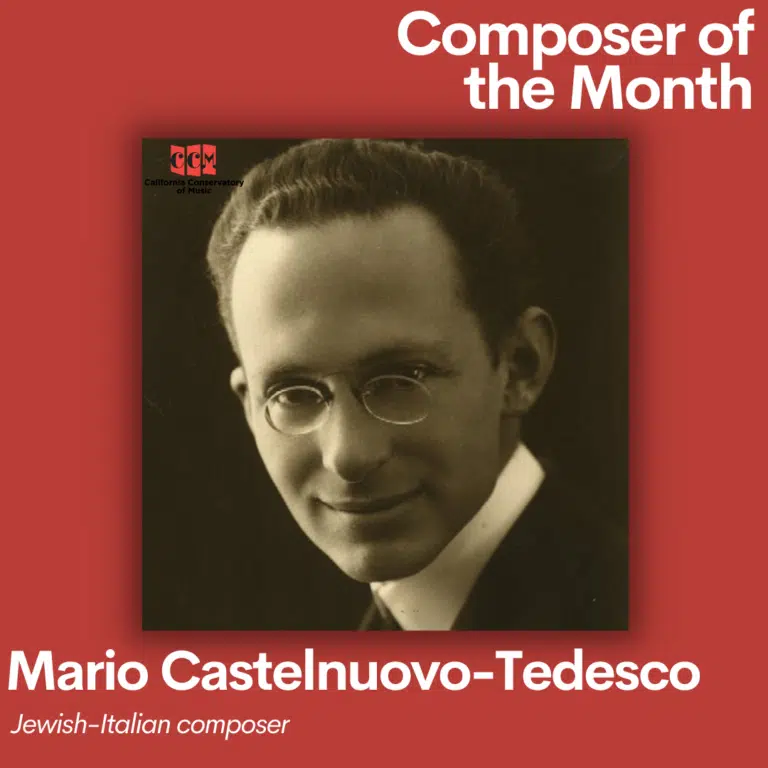
Mario Castelnuovo-Tedesco was an Italian composer and guitarist born in Florence on April 3, 1895. He was known for his prolific output of compositions, including operas, ballets, film scores, and chamber music. He was also an accomplished guitarist and wrote numerous works that have since become staples of the guitar repertoire.
Early Life and Education
Castelnuovo-Tedesco was born into a Jewish family in Florence. He showed a talent for music at a young age and began composing when he was only nine years old. His father was a successful businessman and encouraged his son’s musical pursuits. His father made sure to provide him with the best music education available at the time. Castelnuovo-Tedesco studied composition with Ildebrando Pizzetti and Carlo Rossini at the Liceo Musicale. Meanwhile, he was also working towards his piano degree in Florence.
Composer Career
In the early 1920s, Castelnuovo-Tedesco moved to Rome, where he quickly established himself as a leading composer. He was one of the founders of the Società Italiana di Musica Contemporanea (Italian Society of Contemporary Music), an organization dedicated to promoting new music in Italy. Additionally, he was a member of the influential Roman School of composers, which included Respighi, Casella, and Malipiero.
Throughout his career, Castelnuovo-Tedesco wrote music in a variety of genres, including operas, ballets, choral works, chamber, and orchestral music. Some of his most well-known works include the operas La Mandragola and The Importance of Being Earnest, the ballets The Cypresses Believe in God and L’Amore delle Tre Melarance, and guitar concertos No. 1 and No. 2.
Additionally, Castelnuovo-Tedesco was a prolific composer of film scores, particularly during his time in Hollywood. He composed the scores for over 200 films, including several for the well-known film producer, David O. Selznick, such as the score for the 1939 film version of Wuthering Heights.
Guitar Music
Castelnuovo-Tedesco was a passionate advocate for guitar and wrote more than 100 works for the instrument. He was particularly interested in exploring the guitar’s potential as a solo instrument.
One of Castelnuovo-Tedesco’s most popular guitar works is his 24 Caprichos de Goya, a set of character pieces inspired by the etchings of the Spanish painter Francisco Goya. Furthermore, one of the most frequently performed guitar concertos is his Guitar Concerto No. 1 in D Major. He also wrote several sonatas for guitar and various chamber works featuring the instrument.
Moreover, Castelnuovo-Tedesco’s interest in the guitar was partly due to his friendship with the Spanish guitarist Andrés Segovia. The two met in Rome in the 1920s, and Segovia later commissioned several works from Castelnuovo-Tedesco, including the aforementioned Guitar Concerto No. 1.
United States Career
In 1939, Italy implemented anti-Semitic laws and Castelnuovo-Tedesco emigrated to the United States with his family. Then, he settled in Los Angeles and began working in the film industry, where he quickly established himself as a successful composer of film scores. Despite his success, he continued to write concert music. In fact, he wrote many of his most important works during this time, including his Concerto for Two Guitars and Orchestra, his Sonata for Violin and Guitar, and his String Quartet No. 8.
In Los Angeles, Castelnuovo-Tedesco became part of a vibrant community of émigré artists and intellectuals, including Igor Stravinsky, Arnold Schoenberg, and Thomas Mann. Also, he continued to collaborate with Segovia, who often performed his guitar works in concerts around the world.
Despite his success in the United States, Castelnuovo-Tedesco never forgot his roots in Italy. He maintained close ties with Italian musicians and continued to write music inspired by Italian culture, such as his operas Il Mercante di Venezia and The Merchant of Prato.
Legacy
Castelnuovo-Tedesco died in Los Angeles on March 16, 1968. He left behind a rich legacy of music that continues to be performed and studied today. His music is known for its lyricism, color, and expressive power, and his contributions to the guitar repertoire have helped to establish the instrument as a legitimate concert instrument.
Recently, there has been a renewed interest in Castelnuovo-Tedesco’s music, particularly his guitar works. In 2015, the Italian guitarist Andrea De Vitis released a recording of Castelnuovo-Tedesco’s complete works for solo guitar. Similarly, in 2018, the Italian label Brilliant Classics released a 14-CD box set of his complete guitar music performed by various artists.
Sign up for your free lesson at the California Conservatory of Music!

